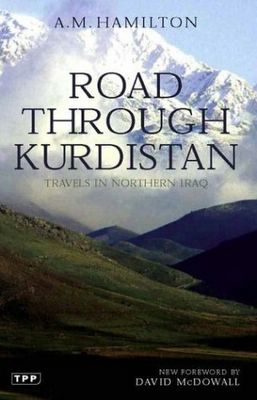Before the Bush White House creates another 'no win' scenario, it is best to realize while Turkey is a soverign nation and no one seeks to change that there is a built in inflexibility to the Turkey government and culture that REQUIRES, Kurds to assimilate into their society to be a part of it. That won''t work, obviously, because of the decades of resistance, uprisings and killings. One might note the 'clashes' between Turkey and Cyprus are also long lived for the same inflexible reasons.
Turkey is viewed by most of the West as a democracy. While the government is elected and the government is conducted in a way conducsive to a democratic system; it is note worthy to realize there are cultural mores' that exceed the laws of government. It is those Turkish cultural dictates that has begun to set PKK apart from the central government. Much of the treatment of women is no different than that of the Taliban.
Which brings me to my next point. What are we doing in the Middle East with troops? We are complicating the circumstances of these people rather than relieving them. Changing cultural mores' cannot be done at the end of a gun. Guns are to eliminate people along with their cultures, so what kind of reason does Turkey and the EU think they are going to give when ONLY the Kurdish culture is held in ridicule. Their reason 'to war' is to kill more Kurds.
Before I get too far afield from my focus here, let me put this straight. There is no killing all those Kurds. PKK resulted primarily because Kurds don't have a homeland. They do however have a Homeland Region. THAT region as noted in the map below nad is huge. It spans many countries. Primarily the borders of countries of which the biggest 'chunck' is Turkey.
PKK was established no different than any other extremist groups such as Hezbollah or Hamas, through solicitous authority undermining the government in favor or food, water, a daily living and acceptance in numbers of others that were/are alike. They were all Kurds. The difference here is that Hezbollah is literally a parasite within Islam, within Lebanon, within Syria. Hamas is also this illegitmate entity within Palestine. They reject the directives of responsible government and rely on hate.
Hezbollah, Hamas, Lebanon and Palestine have no ethnic differences. In the case of Turkey and the Kurds there are huge ethnic and cultural differences and while Turkey would like to demand relief from the circumstances with the Kurds, relying on 'border incursion' issues to bolster it's argument, it is very, very different. Not completely unique to the region except Turkey is willing, unlike other nations, to impose it's standard of describing whom Turks are and are not hence eliminating in a form of genocide, the Kurds and their culture. It is not difficult to realize a genocide could be carried out if enough countries are saying PKK is completely a terrorist organization and needs to be annihilated. Different from Hezbollah, the Kurds do not have a government to fall back on as the Lebanese do.
To put it plainly, as an ethnic Kurd it is impossible to live in Turkey when one does not fit the description. The laws of Turkey aren't democratic so much as autocratic and some as the laws governing relationships between men and women are ancient treating women as chattel.
Iraq warns Turkey against any military incursions (click on)
ATHENS, July 6 (Reuters) - Iraq warned neighbouring Turkey on Thursday to refrain from any military incursions into its northern border region to fight Kurdish guerrillas based there.
Iraqi Foreign Minister Hoshiyar Zebari, on a visit to Athens, noted no Turkish incursions had taken place so far.
"But if this does happen in the future, then our position will be different," he said after meeting Greek counterpart Dora Bakoyanni. "Iraq will demand its borders are not violated and that no country is involved in its domestic matters."
Ankara has kept around 1,500 special forces in northern Iraq since the 1990s to prevent infiltration into southeast Turkey by PKK Kurdish guerrillas.
Earlier this year, Ankara reinforced its southeast border region with 40,000 troops, adding to 220,000 already there.
Turkey has long urged U.S. and Iraqi troops in northern Iraq to crack down on the Kurdish rebels who use their mountain hideouts as a springboard to attack forces across the border.
Ankara blames the banned Kurdistan Workers Party (PKK) for the deaths of at least 30,000 people since the group launched an armed campaign for a separate Kurdish homeland in southeast Turkey in 1984.
"All countries know that sovereignty must be respected and there should be no intervention in domestic issues," Zebari said. "There is no doubt the developments in Iraq are very critical for the whole region.
Having a Kurdistan is not a luxury of generosity for the world, it is a necessity for the people of that ethnic-region. The contention over this issue is far greater than just Turkey. If military stands are taken to eradicate the Kurdish militants from Turkey other countries such as Iraq and Iran will enter the frey beginning a much longer and bloodier confrontation. In my opinion, the region of Kurdistan is so massive and necessary to that region of the world it is negligent of the United Nations to allow this to continue.
Not to reward violence, but, basically the Kurds have done nothing wrong except to live on their native soil. Oil rich soil as well. Much of the oil fields of northern Iraq are tended to by the Kurds of that country. An oil rich land in the wrong hands in a protracted war could easily lend itself to terrorist network wealth and ferocity. Placing lands aside to create a sovereign Kurdistan will go a long way to providing a vehicle for a justified peace. It will stop violence or at least lend itself to defining exactly what violence is against these people. Borders will protect all parties involved and decrease the chance of major clashes between The West and Islam in Turkey.
If the idea is to eliminate PKK, that opens the entire area to war and the use of innocent Kurds as human shields to terrorists. Genocide is easily realized when widespread war would create refugees in a region where there is little land to offer refugee status. By creating Kurdistan the world has done the justice this ethnic peoples deserve while also defining the 'extent' of which they are allowed to define themselves in The Middle East. The Kurds need a homeland with a government carved out of Kurds known to be benevolent to the world and it's generosity towards them. PKK is not an entity to apply government trusts.
Only then will countries like Turkey find a footing for a venue of a UN Resolution to limit the Kurdish population that dominates the southeast corner of that country. This is not a pipe dream although some would say so when realizing the oil involved in such a settlement, however, oil is quickly becoming out of fashion and the wealth Turkey sees today may very well be worthless in the near future.
Currently, to remove PKK from the area is haphazard and cannot be defined in a sane way. It is obviously a movement mired in radical Islamic fundamentalism and has an 'economic' design no different than Hezbollah, Hamas, Islamic Jihad, al Qaeda and the rest of the mess throughout the Arab nations and the world including Indonesia. Only when a Kurdistan is created and an eocnomy that can thrive will the 'warlord' status of the popular leader of PKK be realized as a terrorist to the people of that land.
To be brief, to create Kurdistan with a sovereign authority, will provide a new beginning for the Kurds with the insight of what has gone wrong with other existing terrorist networks that have undermined sovereign authority as in Lebanon and Syria. The same can even be said in Iran although the leader of the country is not the President so much as the Ayatollah is and that is a theocracy, which would also be avoidable when Kurdistan consitution can clearly separate church and state with prohibitions to allow the rise of such influence over the authority of government.
It is wrong at this point in time for any Western nation to take up arms against PKK. There needs to first be relief to the Kurds, their culture and their insured ethnic future by providing a land they can find a sovereign authority without whimsical reprisal by a sovereign authority, such as Turkey, that accommodates them. Currently, the Kurds are allowed to exist without guarantees to exist and that is just hideous in the year 2006. Given the instability of the region and the inability for Iraq to secure internal peace it is obvious what the problem is and the resolve is not simple.
However, there is a resolve and where countries like Turkey see sovereign right to it's borders by engaging in killing they might better see a land that is no use to them and freely allow the Ethnic Kurds to annex it in creation of their homeland under a United Nations Charter.
Respectfully submitted.





